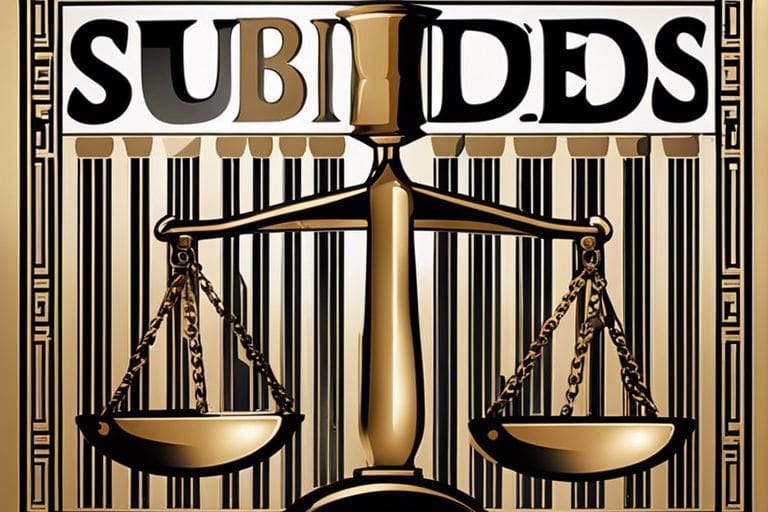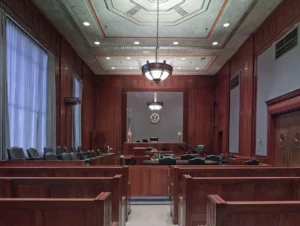Subsidies laws govern the financial assistance provided by the government to individuals, businesses, and organizations to support economic activities, promote public welfare, and achieve policy objectives. These laws are essential for ensuring that subsidies are distributed fairly, transparently, and in compliance with legal requirements. Understanding the legal protections and compliance requirements associated with subsidies is crucial for businesses and professionals navigating this complex area.
Understanding Subsidies Laws
Subsidies laws encompass a broad range of regulations and legal frameworks designed to manage the distribution and use of government subsidies. These regulations ensure that subsidies are awarded and utilized in a manner that aligns with public policy objectives and promotes fairness and accountability.
One of the key components of subsidies laws is eligibility criteria. Eligibility criteria determine who can receive subsidies and under what conditions. These criteria are established by federal, state, and local government agencies and vary depending on the type of subsidy and the policy objectives it aims to achieve. For example, agricultural subsidies may have specific requirements related to crop production, land use, and environmental conservation.
Application and Approval Processes: The process of applying for and receiving subsidies involves several steps, including submitting an application, providing supporting documentation, and undergoing a review process. Government agencies review applications to ensure that applicants meet the eligibility criteria and that the proposed use of the subsidy aligns with policy objectives. The approval process may also involve public hearings, stakeholder consultations, and environmental assessments.
Reporting and Accountability: Subsidies laws also include requirements for reporting and accountability. Recipients of subsidies must maintain accurate records of how the funds are used and provide regular reports to the government agency that awarded the subsidy. These reports help ensure that subsidies are used for their intended purposes and that any misuse or fraud is detected and addressed promptly.
Key Compliance Strategies
Compliance with subsidies laws is essential for businesses and organizations to avoid legal issues and ensure that they can continue to receive government assistance. Here are some key strategies to ensure compliance:
- Understanding Eligibility Criteria: Businesses and organizations must thoroughly understand the eligibility criteria for the subsidies they seek. This includes reviewing the specific requirements for each subsidy program, ensuring that they meet all conditions, and staying updated with any changes or amendments to the criteria.
- Effective Documentation and Record-Keeping: Maintaining accurate and thorough records is crucial for demonstrating compliance with subsidies laws. This includes keeping receipts, invoices, financial statements, and other documentation that supports the use of subsidy funds. Proper documentation is essential for substantiating eligibility, tracking the use of funds, and providing the required reports to government agencies.
- Regular Reporting and Audits: Regular reporting and audits are critical for ensuring compliance with subsidies laws. Recipients of subsidies must provide regular reports to government agencies, detailing how the funds are used and demonstrating compliance with the terms and conditions of the subsidy. Conducting internal audits can help identify any areas of non-compliance and take corrective action before issues escalate.
- Engaging Legal and Financial Professionals: Engaging legal and financial professionals who specialize in subsidies laws can provide valuable guidance on compliance. These professionals can assist with understanding eligibility criteria, preparing documentation, and ensuring that all reporting and accountability requirements are met. They can also help navigate any legal issues that may arise and represent the business or organization in dealings with government agencies.
Legal Protections in Subsidies Laws
Subsidies laws include various legal protections to ensure that recipients of subsidies are treated fairly and that the distribution of subsidies is transparent and accountable. These protections are designed to prevent discrimination, ensure equal access to subsidies, and promote the responsible use of public funds.
Non-Discrimination: One of the key legal protections in subsidies laws is the principle of non-discrimination. Government agencies must distribute subsidies in a manner that does not discriminate based on race, gender, age, disability, or other protected characteristics. This ensures that all eligible individuals and organizations have equal access to subsidies and that the distribution of subsidies promotes social equity and inclusion.
Transparency and Accountability: Transparency and accountability are fundamental principles of subsidies laws. Government agencies must ensure that the process of awarding and using subsidies is transparent and that recipients are held accountable for how they use the funds. This includes providing clear information about eligibility criteria, application processes, and reporting requirements, as well as conducting regular audits and investigations to detect and address any misuse or fraud.
Appeals and Dispute Resolution: Recipients of subsidies have the right to appeal decisions made by government agencies and to seek resolution of disputes related to subsidies. This includes appealing denials of subsidy applications, challenging the terms and conditions of subsidies, and seeking redress for any discrimination or unfair treatment. Legal professionals can assist with navigating the appeals and dispute resolution process and representing recipients in hearings and negotiations.
Common Compliance Issues
Several common compliance issues can arise in the context of subsidies laws, including eligibility disputes, misuse of funds, and reporting deficiencies. Understanding these common issues can help businesses and organizations prepare and address potential problems.
- Eligibility Disputes: Disputes over eligibility are a common issue in subsidies laws. These disputes may arise when an applicant believes they meet the eligibility criteria but their application is denied, or when a recipient’s eligibility is questioned during an audit. Understanding the specific eligibility criteria for each subsidy program and providing thorough documentation can help resolve these disputes.
- Misuse of Funds: Misuse of subsidy funds is another common issue. This can include using funds for purposes that are not allowed under the terms and conditions of the subsidy, failing to maintain proper documentation, or engaging in fraudulent activities. Regular audits and effective documentation and record-keeping can help prevent and address issues related to misuse of funds.
- Reporting Deficiencies: Reporting deficiencies can occur when recipients fail to provide the required reports to government agencies or when the reports are incomplete or inaccurate. Ensuring that all reporting requirements are met and that the reports are accurate and complete is essential for maintaining compliance with subsidies laws.
The Importance of Legal and Financial Guidance
Navigating the complexities of subsidies laws requires a thorough understanding of legal and financial requirements. Engaging legal and financial professionals who specialize in subsidies laws can provide valuable assistance and ensure that businesses and organizations meet all compliance requirements.
Role of Legal Professionals: Legal professionals can provide guidance on eligibility criteria, assist with preparing and submitting applications, and represent recipients in dealings with government agencies. They can also help navigate the appeals and dispute resolution process and ensure that recipients’ rights are protected.
Role of Financial Professionals: Financial professionals can assist with maintaining accurate records, preparing financial statements, and ensuring that all reporting requirements are met. They can also conduct internal audits to identify and address any compliance issues and provide guidance on the responsible use of subsidy funds.
Benefits of Professional Guidance: Engaging legal and financial professionals can help reduce the risk of non-compliance, prevent legal issues, and ensure that businesses and organizations can continue to receive government assistance. Professional guidance can also help achieve a more favorable outcome in any disputes or appeals related to subsidies.
The Impact of Non-Compliance
Non-compliance with subsidies laws can have significant consequences for businesses and organizations. These consequences can include financial penalties, loss of subsidies, and reputational damage. Understanding the impact of non-compliance is crucial for businesses and organizations to take proactive measures to ensure compliance.
Financial Penalties: One of the primary consequences of non-compliance with subsidies laws is financial penalties. Government agencies may impose fines or require the repayment of subsidy funds if recipients are found to be in violation of the terms and conditions of the subsidy. These penalties can have a significant financial impact on businesses and organizations and may affect their ability to continue operating.
Loss of Subsidies: Non-compliance can also result in the loss of subsidies. Government agencies may terminate or revoke subsidies if recipients fail to meet the eligibility criteria, misuse funds, or fail to comply with reporting requirements. The loss of subsidies can affect the financial stability of businesses and organizations and may limit their ability to achieve their goals.
Reputational Damage: Non-compliance with subsidies laws can also lead to reputational damage. Businesses and organizations found to be in violation of the law may face negative publicity, loss of trust from stakeholders, and damage to their reputation. Reputational damage can have long-term consequences and may affect the ability of businesses and organizations to attract funding, customers, and partners.
Best Practices for Compliance
To ensure compliance with subsidies laws, businesses and organizations should adopt best practices that promote transparency, accountability, and responsible use of funds. Here are some best practices for compliance:
- Regular Training and Education: Providing regular training and education on subsidies laws and compliance requirements is essential for all personnel involved in managing and using subsidy funds. This includes training on eligibility criteria, documentation and record-keeping, reporting requirements, and ethical standards.
- Establishing Internal Controls: Implementing internal controls can help ensure compliance with subsidies laws. Internal controls include policies and procedures for managing and using subsidy funds, conducting regular audits, and monitoring compliance with reporting requirements.
- Engaging Stakeholders: Engaging stakeholders, including employees, customers, and partners, in the compliance process can help promote transparency and accountability. This includes providing clear information about subsidies, involving stakeholders in decision-making processes, and addressing any concerns or issues that arise.
- Monitoring and Reporting: Regular monitoring and reporting on the use of subsidy funds is essential for maintaining compliance. This includes conducting regular audits, providing accurate and complete reports to government agencies, and addressing any issues or discrepancies that arise.
Conclusion
Subsidies laws are a critical component of the legal framework governing government financial assistance. Understanding the legal protections and compliance requirements associated with subsidies is essential for businesses and organizations to navigate this complex area effectively. By understanding eligibility criteria, maintaining accurate records, conducting regular audits, and engaging legal and financial professionals, businesses and organizations can ensure compliance with subsidies laws and achieve successful outcomes.
For more information on subsidies laws and to find qualified legal professionals who can assist with your compliance needs, visit Attorneys.Media. This platform provides access to a wide range of legal resources and expert guidance to support your compliance efforts.
This article provides a comprehensive overview of subsidies laws and highlights the importance of understanding legal protections and compliance strategies. By following best practices and seeking expert guidance, businesses and organizations can effectively navigate subsidies laws and achieve successful outcomes.





















